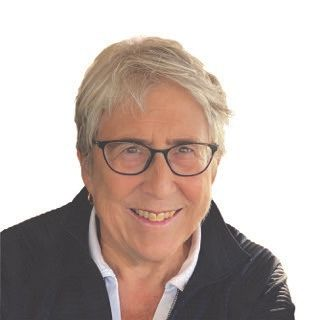Advances in science are personal to ARCS member Linda Burke. She has learned firsthand since second grade that unless a hearing problem is correctly identified, you can’t fix it. But years later, when you can finally hear on a more normal level, medical and technological advances are “pretty amazing.”
Despite less than perfect hearing, Burke finished college and law school and spent years as a corporate tax attorney. She has served leadership roles with several non-profits, including being the first Diversity, Equity, and Inclusion (DEI) committee chair for ARCS National. She is on the board of the ARCS Pittsburgh chapter, which she joined in 2007.
“Obviously I am super grateful for science,” Burke explains, “for the people who developed my bionic ear. It’s been life-changing.”
In grade school in West Virginia, her parents took Burke for several hearing tests with an ear, nose, and throat doctor. She passed those tests. The doctor told her parents, “Maybe she’s just not listening.” Years later Burke was diagnosed as extremely hard of hearing. “It was not detected,” Burke says, “because I could hear high frequency. That’s one of the reasons my speech is relatively normal.” The hearing deficiency, called “cookie bite” or neurosensory deafness, was likely caused by a bad case of red measles when she was four.
Burke managed with imperfect hearing through high school. William & Mary College presented challenges like large lecture halls. Class notes had to be checked with other students. When Burke agreed to dates via a telephone conversation, sorority sisters checked the reception area so they could confirm which young man had arrived before Burke went downstairs.
Burke knew that hearing aids would be necessary for law school. When she got the hearing aids as a college senior, she was amazed at the difference it made. “I walked out the door and I remember my back going back against the door because I had never heard street noise before. The noise of passing traffic just stunned me.”
Burke got her "bionic ear" in her fifties, a cochlear implant as a result of her hearing diminishing dramatically. It was then she learned her hearing loss was not typical. Her hearing fit the pattern of sensorineural deafness, except she could hear women's voices, but not men's. “When I went to hearing specialists in Pittsburgh, they convened all the residents and interns to view me and my exam.” The cochlear implant improved her hearing significantly. Burke will upgrade to her fourth one this year.
Providing equal opportunities for individuals motivates Burke to lead ARCS Foundation’s progress with diversity, equity and inclusion. “What drives me more than anything is fairness, the equity side of it, that all people have the same chance, the same opportunities,” she says. “That’s what I’m working for.”
Now retired, Burke has the time for volunteer leadership. The ARCS National DEI committee has twenty-three members from several chapters. Progress on several initiatives will be reported at the ARCS National June 2023 board meeting.

